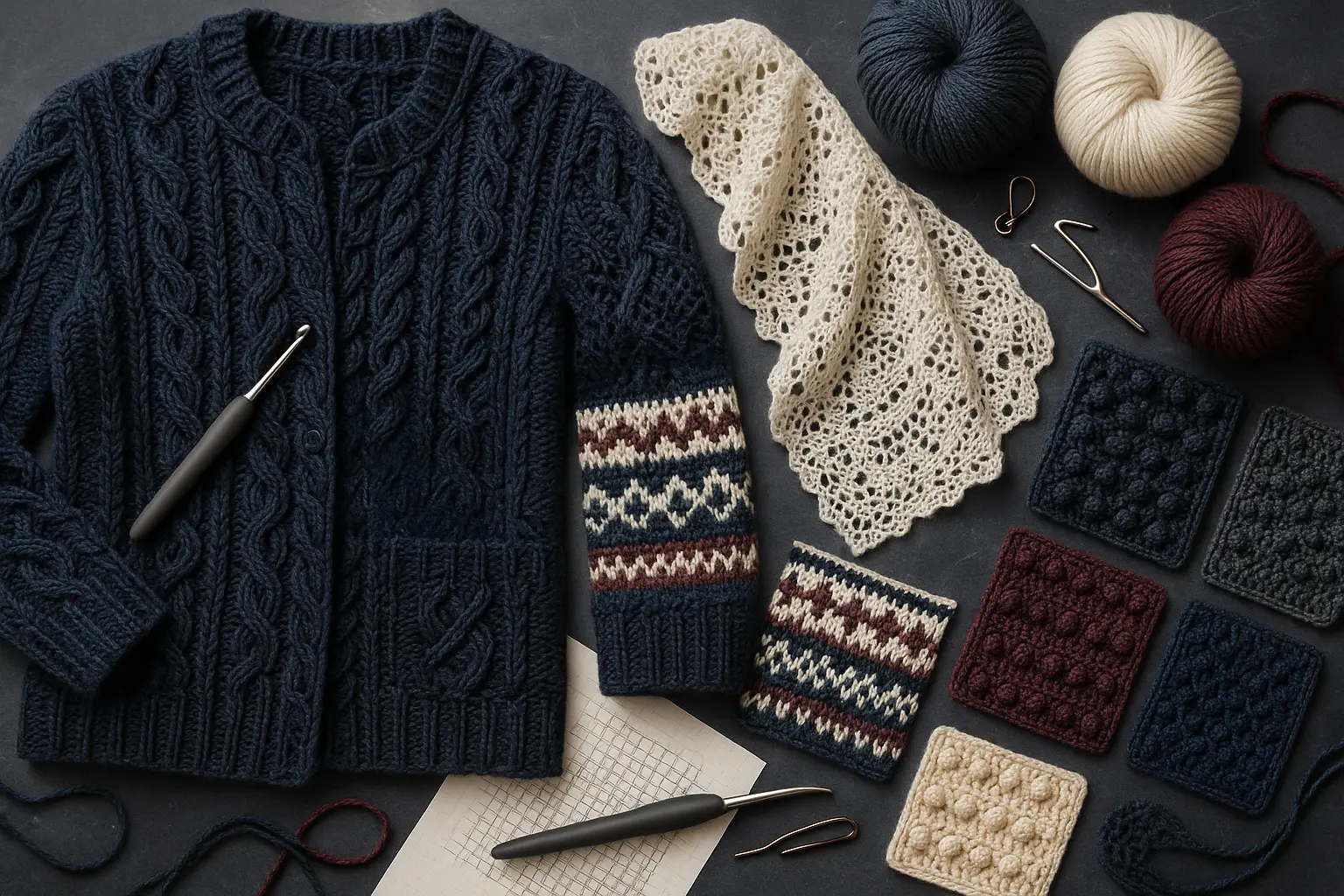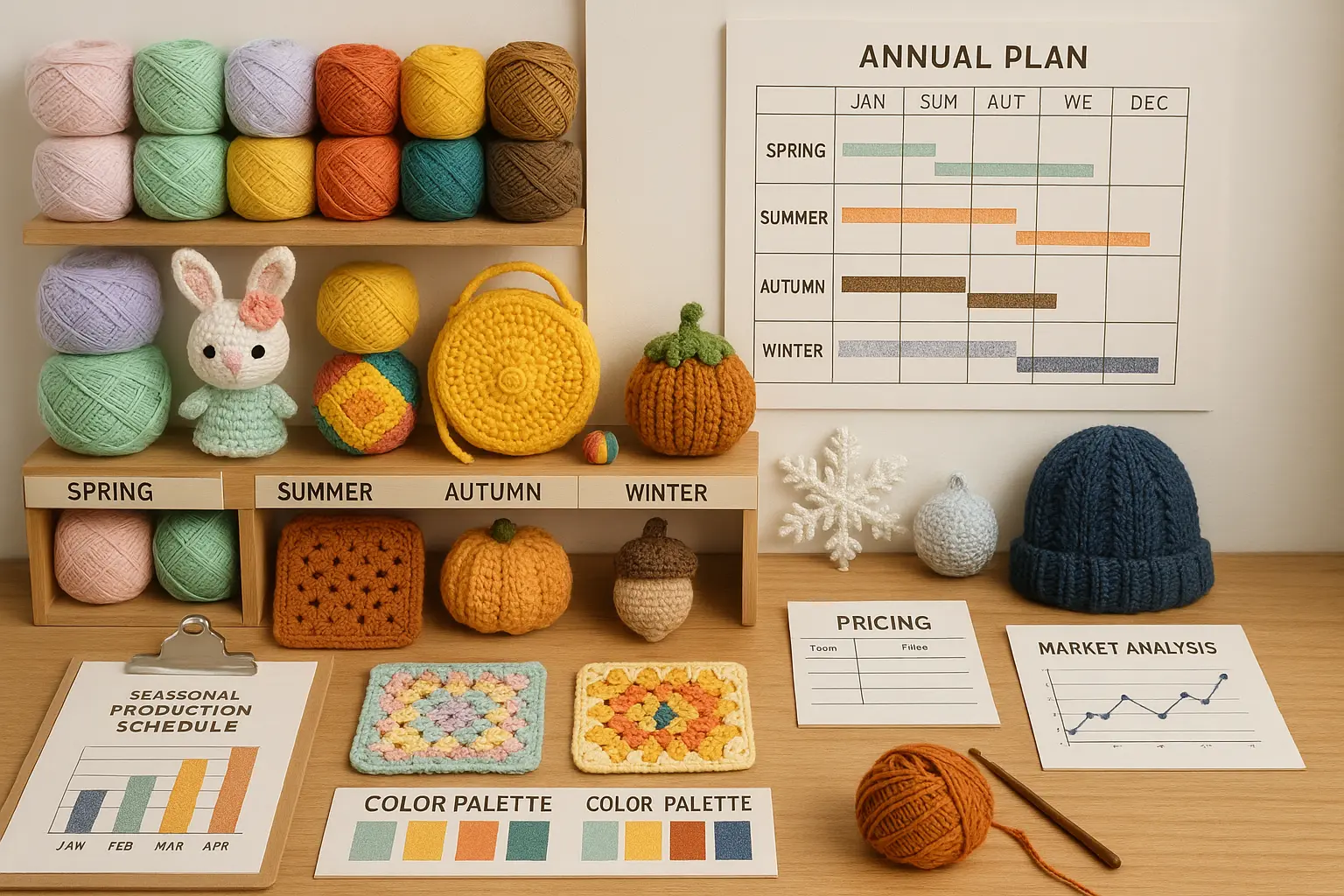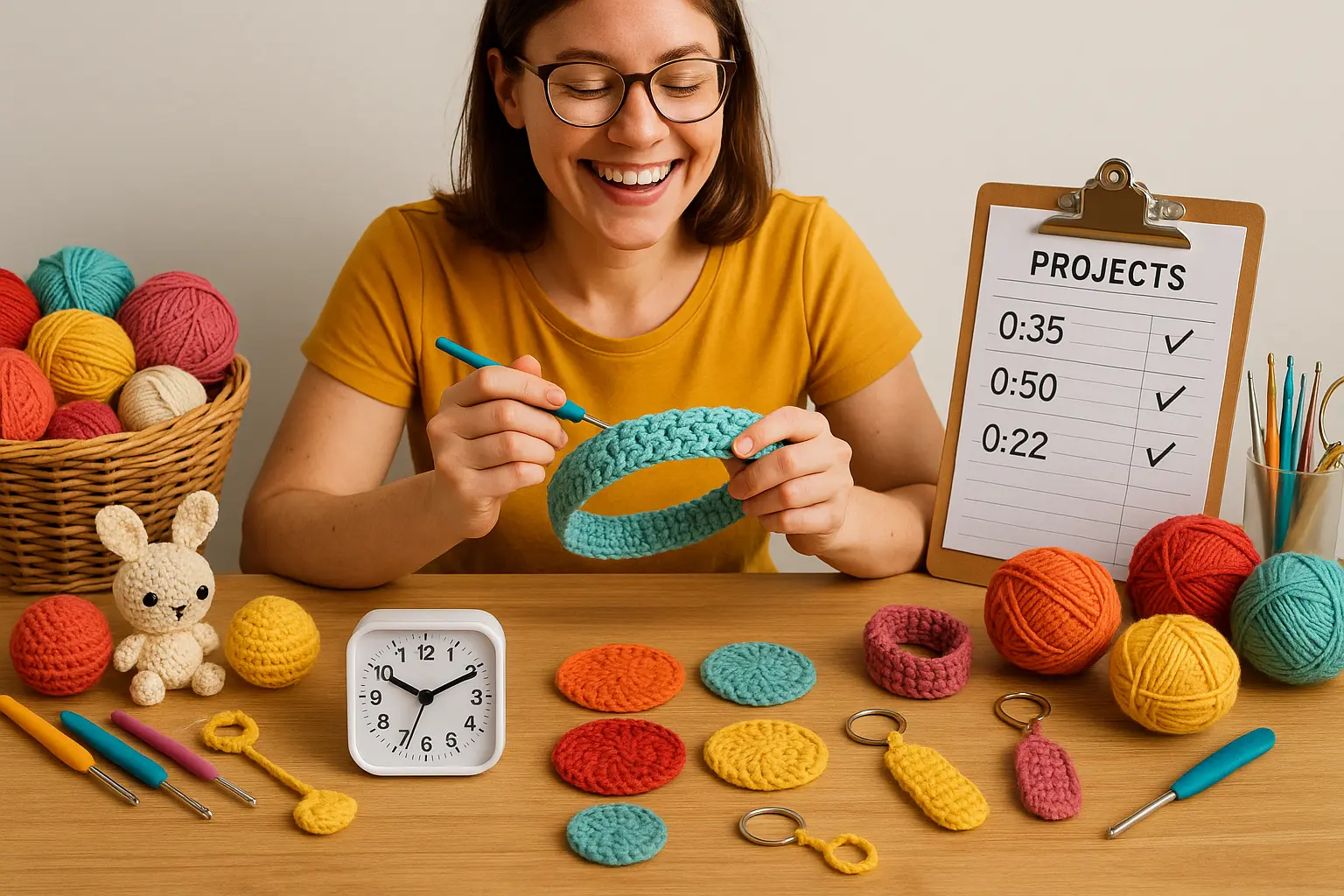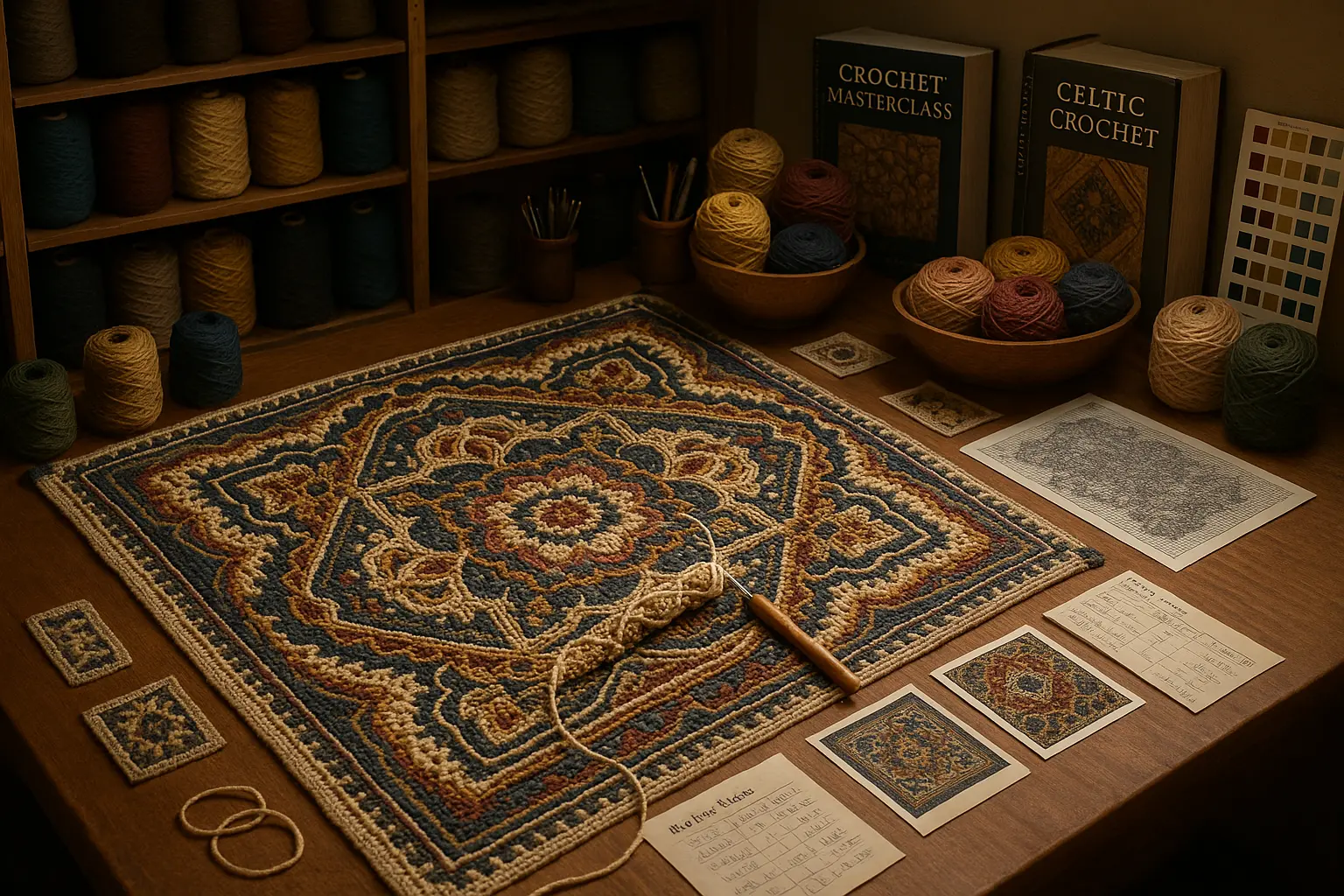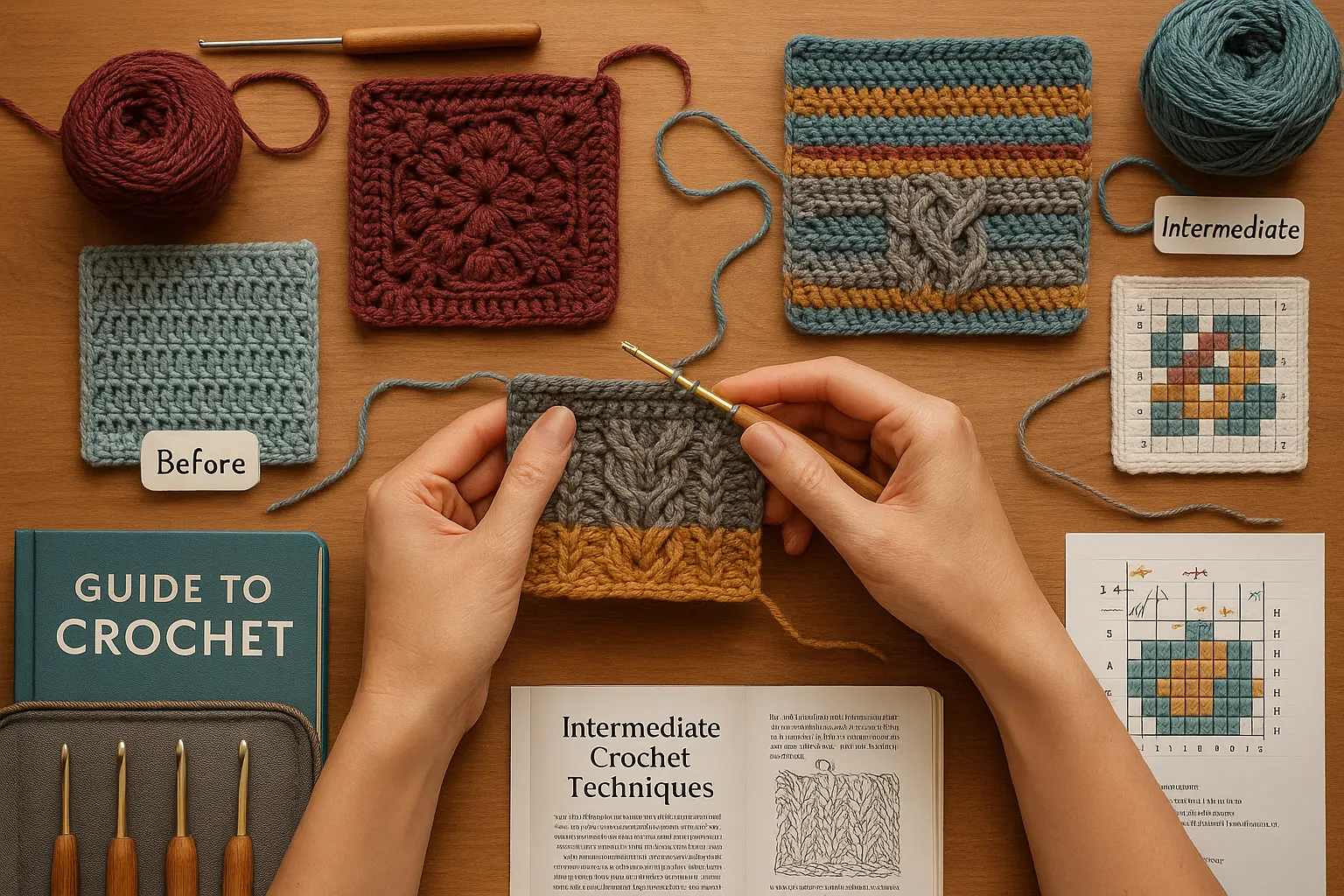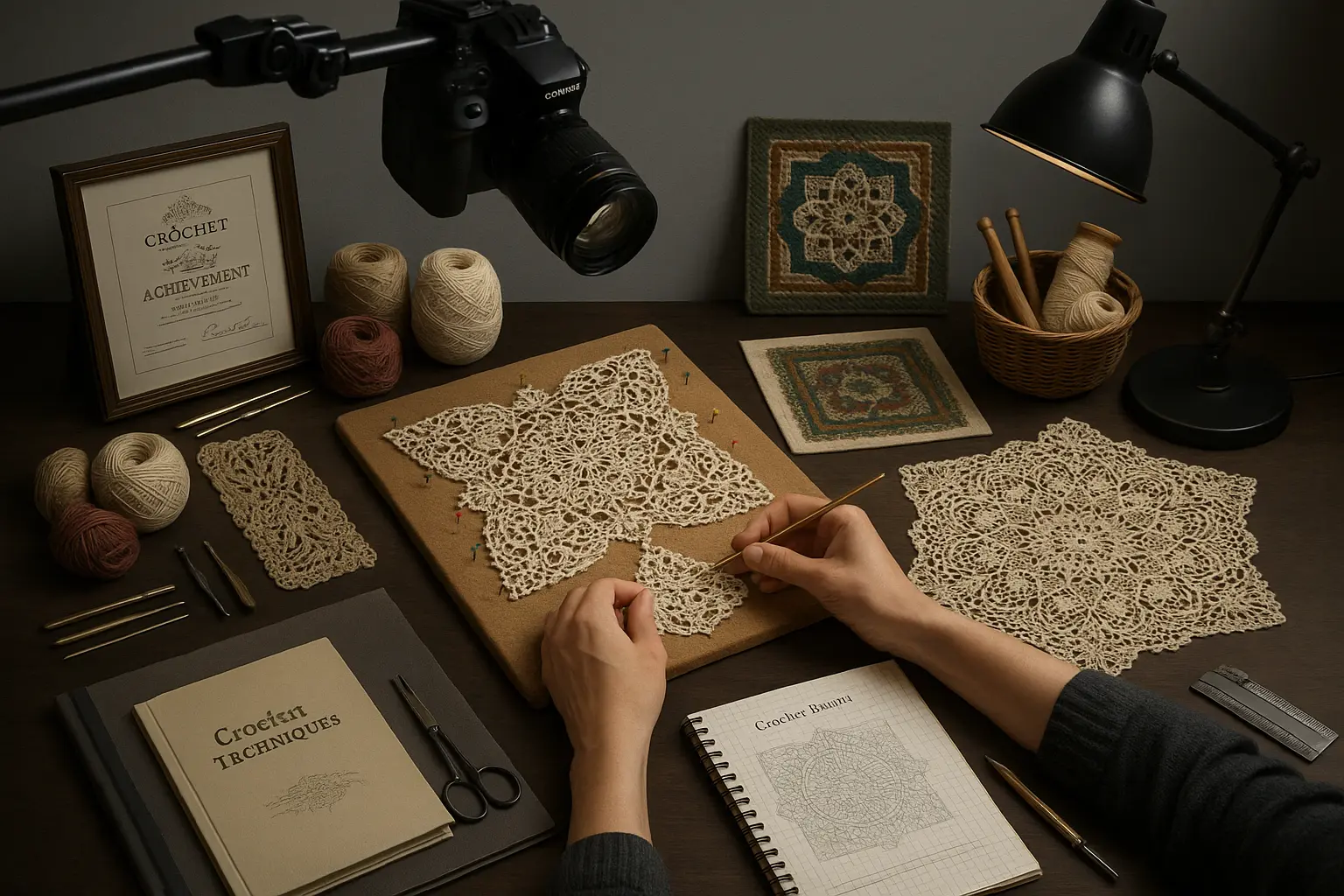Ready to transform your crochet from hobby to professional-level artistry? This comprehensive guide covers 15+ advanced techniques that separate expert crocheters from beginners. Whether you're preparing to launch your crochet business or simply want to create museum-quality pieces, these sophisticated methods will revolutionize your crafting.
Why Learn Advanced Crochet Techniques?
Advanced techniques unlock creative possibilities that basic stitches simply can't achieve. Professional crocheters command higher prices for items featuring complex cables, intricate colorwork, and seamless construction. According to Craft Industry Alliance, handmade items with advanced techniques sell for 40-60% more than basic pieces.
Benefits of mastering advanced techniques:
- Create unique, professional-quality pieces
- Command premium prices for your work
- Expand your design vocabulary
- Tackle complex designer patterns
- Build confidence in your crochet abilities
Complex Stitch Patterns That Wow
Cable Stitches: Creating Sculptural Texture
Cable stitches transform flat fabric into three-dimensional art. These raised, rope-like patterns add sophistication to any project and are essential for advanced crochet techniques.
Essential Cable Fundamentals:
Cables work by crossing stitches over each other, creating the illusion of woven ropes. The basic principle involves working stitches out of order—skipping stitches, working ahead, then returning to complete the skipped stitches.
Step-by-Step 4-Stitch Left-Leaning Cable:
- Skip 2 stitches - These will be worked later
- Work 2 double crochet in the next 2 stitches
- Reach back and work 2 double crochet in the skipped stitches
- Continue pattern - The crossed stitches create the cable effect
Advanced Cable Variations:
- Honeycomb cables: Interlocking diamond patterns requiring precise stitch counting
- Braided cables: Three or more cable groups woven together
- Celtic knot cables: Complex interwoven designs inspired by Irish traditions
- Aran-style panels: Traditional Irish patterns combining multiple cable motifs
Pro Tip: Use a cable needle to hold stitches when working complex crossings. This prevents dropped stitches and maintains even tension.
Lace Stitches: Mastering Openwork Elegance
Lace crochet requires precision and patience but creates breathtakingly delicate results. Master these techniques to create heirloom-quality shawls, doilies, and summer garments.
Foundation Lace Techniques:
- Chain spaces: The building blocks of lace patterns
- Increase/decrease balance: Maintaining stitch count while creating openwork
- Yarn overs: Creating deliberate holes in the fabric
- Cluster stitches: Grouping multiple stitches for texture contrast
Essential Lace Patterns Every Advanced Crocheter Should Know:
Shell Stitch Variations:
- Basic 5-dc shell: Foundation for countless patterns
- Graduated shells: Varying shell sizes for shaping
- Inverted shells: Creates scalloped edges
- Double shells: Two shells worked into same space
V-Stitch Family:
- Simple V-stitch: (dc, ch 1, dc) in same space
- Extended V-stitch: (dc, ch 2, dc) for larger openwork
- Graduated V-stitch: Varying chain spaces for visual interest
Advanced Filet Crochet: Traditional grid-based technique using double crochet and chain spaces to create pictorial designs. Essential for vintage-style table runners and decorative panels.
Blocking is Critical: Lace patterns only reach their full potential after proper blocking. Wet blocking with rustproof pins reveals the true beauty of lace openwork.
Textured Stitches: Adding Dimensional Drama
Create fabric that begs to be touched with these three-dimensional stitch techniques.
Bobble Stitch Mastery:
Bobbles create raised bumps that add texture and visual interest. The key is maintaining consistent tension while working multiple incomplete stitches in the same space.
Perfect Bobble Technique:
- Yarn over, insert hook, pull through (3 loops on hook)
- Yarn over, pull through 2 loops (2 loops remain)
- Repeat steps 1-2 four more times in same stitch
- Yarn over, pull through all 6 loops
- Chain 1 to secure
Popcorn Stitch Variations:
- 5-dc popcorn: Most common, medium height
- 7-dc popcorn: Extra tall for dramatic effect
- Single crochet popcorn: Lower profile option
- Reverse popcorn: Creates indented texture
Puff Stitch Family: Puff stitches create soft, cloud-like texture perfect for baby items and cozy accessories. The secret is pulling each yarn over to the same height for uniform puffs.
Colorwork Techniques: Painting with Yarn
Master these colorwork methods to create stunning visual effects that rival any painted artwork.
Intarsia Crochet: Block Color Perfection
Intarsia allows you to work large areas of solid color without carrying yarn across the back of the work. This technique is essential for geometric patterns and pictorial designs.
Intarsia Success Strategies:
Yarn Management:
- Use separate yarn balls for each color section
- Wind small amounts onto bobbins for small sections
- Keep yarns organized to prevent tangling
- Change colors at the beginning of stitches, not in the middle
Color Change Technique:
- Work to the last 2 loops of the final stitch in the old color
- Yarn over with the new color
- Pull through both loops
- Twist yarns to prevent holes
- Continue with new color
Professional Intarsia Tips:
- Plan your design on graph paper first
- Use contrasting colors for clear definition
- Weave in ends as you work to save finishing time
- Block finished pieces to even out color changes
Fair Isle Crochet: Traditional Multicolor Magic
Fair Isle techniques create intricate repeating patterns using multiple colors in the same row. This traditional Scottish method produces stunning results but requires careful tension management.
Fair Isle Fundamentals:
Yarn Dominance: Hold your primary pattern color in your dominant hand and background color in the non-dominant hand. This creates clearer pattern definition.
Carrying Yarn Rules:
- Never carry yarn more than 3-4 stitches
- Maintain loose but consistent tension on carried yarns
- Check the wrong side regularly for even tension
- Use yarn dominance to make patterns "pop"
Advanced Fair Isle Techniques:
- Steeks: Cut fabric to create openings (requires significant practice)
- Stranded colorwork: Complex patterns with multiple color changes
- Gradient effects: Gradually shifting colors for ombré effects
Tapestry Crochet: Dense, Detailed Imagery
Tapestry crochet creates dense, sturdy fabric perfect for bags, pillows, and wall hangings. Unlike other colorwork methods, unused colors are carried inside the stitches, creating a thick, reversible fabric.
Tapestry Technique Mastery:
Yarn Encasement Method:
- Hold unused color along the top of the previous row
- Work stitches over the carried yarn
- Keep carried yarn taut but not tight
- Change colors by working over both old and new yarns
Tapestry Design Planning:
- Use graph paper with 1:1 ratio (1 square = 1 stitch)
- Choose high-contrast colors for clarity
- Start with simple geometric patterns
- Progress to pictorial designs as skills develop
Advanced Construction Methods
Seamless Construction: No-Sew Solutions
Modern crochet construction eliminates tedious seaming while creating professional-looking garments.
Top-Down Sweater Construction:
This revolutionary method begins at the neckline and works downward, creating a seamless garment with minimal finishing.
Benefits of Top-Down Construction:
- Try on as you work for perfect fit
- No shoulder seams to align
- Easy sleeve attachment
- Minimal finishing work required
Key Techniques for Seamless Construction:
- Raglan increases: Work increases at four raglan lines
- Sleeve separation: Place sleeve stitches on holders
- Body continuation: Work body in rounds to desired length
- Sleeve finishing: Return to held stitches and work sleeves
Short Rows: Sculptural Shaping
Short rows create curves and angles in crochet fabric, essential for fitted garments and shaped accessories.
German Short Rows (Recommended Method):
This technique creates nearly invisible turns without wrapping stitches.
German Short Row Process:
- Work to the turning point
- Turn work without wrapping
- Pull working yarn to create a twin stitch
- Continue working in the new direction
- When returning, work the twin stitch as one
Short Row Applications:
- Bust darts: Create fitted bodices
- Shoulder slopes: Professional garment shaping
- Heel turns: Essential for crochet socks
- Curved hems: Eliminate riding up in garments
Modular Construction: Building Block Approach
Create complex designs by combining simple geometric shapes.
Popular Modular Shapes:
- Granny squares: Classic and versatile
- Hexagons: Create honeycomb patterns
- Triangles: Perfect for shawls and afghans
- Circles: Unique and eye-catching designs
Join-As-You-Go Methods: Save hours of finishing time by connecting motifs as you create them.
JAYG Advantages:
- Eliminates bulk from seams
- Creates decorative joining lines
- Reduces finishing time by 70%
- Allows for design modifications during construction
Professional Finishing Techniques
Blocking: The Game-Changer
Proper blocking transforms amateur-looking work into professional pieces. Learn more about essential crochet tools including blocking equipment.
Blocking Method Selection:
Wet Blocking (Natural Fibers):
- Provides maximum shaping capability
- Best for cotton, wool, linen, alpaca
- Allows for significant size adjustment
- Creates crisp stitch definition
Steam Blocking (Synthetic Blends):
- Gentle method for heat-sensitive fibers
- Reduces blocking time
- Good for acrylic blends
- Maintains yarn memory
Spray Blocking (Delicate Items):
- Minimal handling required
- Perfect for lace and openwork
- Gentle on fragile vintage yarns
- Quick and convenient
Edge Finishing: Professional Details
Transform raw edges into polished, professional borders.
Border Selection Guide:
Single Crochet Borders: Clean, simple finish perfect for geometric designs Picot Edges: Decorative scalloped effect ideal for feminine pieces Shell Borders: Elegant, flowing finish for curved edges Crab Stitch (Reverse SC): Creates a rope-like edge that won't curl
Buttonhole Excellence:
Professional buttonholes are sized precisely for their intended buttons and maintain structural integrity.
Horizontal Buttonhole Formula:
- Measure button diameter
- Create chain space = button diameter + 1mm
- Reinforce with tight stitches around opening
- Test fit before finishing
Advanced Pattern Reading and Modification
Chart Reading Mastery
Symbol charts are the universal language of crochet, allowing you to follow patterns from any country.
Chart Reading Fundamentals:
- Read charts from bottom to top, right to left
- Each symbol represents one stitch
- Repeat sections are clearly marked
- Row numbers appear on the side
International Symbol Variations: Different countries may use slightly different symbols. Familiarize yourself with Craft Yarn Council standard symbols.
Pattern Modifications for Perfect Fit
Transform any pattern to fit your exact measurements.
Size Adjustment Strategies:
- Length adjustments: Add or subtract rows in non-shaping areas
- Width adjustments: Recalculate stitch counts based on your gauge
- Ease modifications: Adjust fit from close-fitting to oversized
- Yarn substitutions: Convert between yarn weights using math
Essential Measurements for Garment Success:
- Bust/chest circumference + ease
- Shoulder width and slope
- Arm length and circumference
- Torso length preferences
- Hip circumference (for longer garments)
Troubleshooting Advanced Techniques
Common Challenges and Solutions
Tension Inconsistencies:
- Practice new techniques with scrap yarn first
- Take frequent breaks to avoid hand fatigue
- Use consistent hook grip and yarn tension
- Consider hook size adjustments for different techniques
Color Management Chaos:
- Organize yarns with yarn bobbins
- Plan color changes at row beginnings when possible
- Use yarn clips to secure unused colors
- Keep a notebook of color placement for complex patterns
Pattern Complexity Overwhelm:
- Break complex patterns into manageable sections
- Use stitch markers liberally
- Highlight completed rows on written patterns
- Take progress photos for reference
Quality Control Standards
Professional crocheters maintain consistent standards throughout their work.
Quality Benchmarks:
- Consistent stitch tension across entire piece
- Clean, invisible color changes
- Properly blocked and finished edges
- No visible yarn ends or loose stitches
- Even seams and joins
Building Your Advanced Skill Set
Progressive Skill Development
Month 1-2: Cable Mastery
- Start with simple 2-over-2 cables
- Progress to complex Aran panels
- Complete a cable scarf or cowl
Month 3-4: Lace Techniques
- Master basic shell and V-stitch patterns
- Attempt a simple lace shawl
- Learn proper blocking techniques
Month 5-6: Colorwork Exploration
- Begin with simple Fair Isle patterns
- Try intarsia with geometric designs
- Create a colorwork pillow or bag
Month 7-8: Construction Innovation
- Learn seamless sweater construction
- Master short row shaping
- Complete a fitted garment
Advanced Project Recommendations
Skill-Building Projects by Technique:
For Cable Practice:
- Aran sweater with traditional panels
- Cable-paneled afghan squares
- Cabled headband or cowl
For Lace Development:
- Feather and fan baby blanket
- Pineapple doily (traditional challenge)
- Lightweight summer cardigan
For Colorwork Excellence:
- Fair Isle-inspired pillow covers
- Tapestry crochet market bag
- Intarsia wall hanging
Professional Development Resources
Online Learning Platforms:
- Craftsy: Video classes with expert instructors
- YouTube channels featuring advanced techniques
Essential Reference Books:
- "The Fleisher's Crochet Techniques Manual" - Comprehensive stitch dictionary
- "Crochet Master Class" by Jean Leinhauser - Advanced construction methods
- "Beyond Basic Crochet" by Rita Weiss - Innovative techniques
Community Resources:
- Ravelry forums for technique discussions
- Local guild meetings for hands-on learning
- Crochet-along events for motivation and support
Taking Your Skills Professional
Design Development
Once you've mastered advanced techniques, consider developing your own patterns. Understanding product pricing strategies becomes crucial when selling original designs.
Pattern Writing Skills:
- Learn standard pattern notation
- Include helpful technique explanations
- Provide multiple sizes when appropriate
- Test patterns thoroughly before publication
Building Your Brand: Establish yourself as an expert in advanced techniques through:
- Social media tutorials showcasing your skills
- Teaching workshops in your community
- Selling patterns featuring advanced techniques
- Building an email list of fellow advanced crocheters
Business Applications
Advanced techniques command premium prices in the handmade market. Consider specializing in:
- Custom wedding accessories with intricate lacework
- Heirloom baby items featuring complex stitches
- High-end home décor with sophisticated colorwork
- Fashion accessories showcasing innovative construction
Learn more about turning your advanced skills into profit in our crochet business success guide.
Measuring Your Progress
Skill Assessment Checklist
Cable Proficiency:
- [ ] Can work basic 2-over-2 cables without pattern
- [ ] Successfully completed 4-over-4 complex crossing
- [ ] Created original cable panel design
- [ ] Incorporated cables into garment construction
Lace Mastery:
- [ ] Achieved consistent tension in openwork patterns
- [ ] Successfully blocked lace to proper dimensions
- [ ] Read and executed chart-only lace patterns
- [ ] Designed original lace border
Colorwork Excellence:
- [ ] Maintained even tension in Fair Isle work
- [ ] Completed intarsia pictorial design
- [ ] Successfully worked tapestry crochet
- [ ] Combined multiple colorwork techniques in one piece
Construction Innovation:
- [ ] Completed seamless top-down garment
- [ ] Used short rows for garment shaping
- [ ] Joined motifs using JAYG methods
- [ ] Modified existing pattern for perfect fit
Conclusion: Your Advanced Crochet Journey
Mastering advanced crochet techniques transforms your relationship with the craft from hobby to artistry. These sophisticated methods enable you to create pieces that rival designer garments and command professional prices in the marketplace.
The journey to advanced proficiency requires patience, practice, and persistence. Don't attempt to master everything at once—focus on one technique category at a time, building confidence through successful completions before moving to the next challenge.
Remember that even advanced crocheters continue learning throughout their crafting lives. New techniques emerge regularly, and traditional methods evolve with modern innovations. Stay curious, experiment fearlessly, and share your knowledge with the crochet community.
Ready to expand your skills even further? Explore our crochet stitch library for detailed tutorials on specific advanced stitches.
Want to turn your advanced skills into income? Our comprehensive business setup guide shows you how to price, market, and sell high-end crochet items that showcase your professional-level techniques.
Join our community of advanced crocheters! Share your complex creations on social media using #KitCrochetAdvanced and connect with fellow artisans pushing the boundaries of what's possible with hook and yarn.
Ready to master these techniques? Our KitCrochet Bundle includes advanced pattern libraries, video tutorials, and business tools to accelerate your journey to crochet expertise. Get immediate access to step-by-step guides for every technique covered in this article, plus exclusive patterns that let you practice your new skills.
